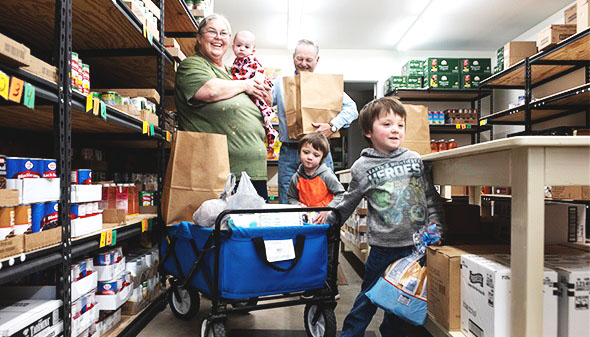
Bolstered by a $1.5 million grant from the Communities Foundation of Texas’ W.W. Caruth, Jr. Fund, the 2023 Texas Health Community Impact grants represent the largest yearly amount given by Texas Health to date. Since 2019, Texas Health has awarded more than $18 million in grants to local organizations.
“In our Mission to improve the health of those in the communities we serve, Texas Health knows we can better address health disparities and the socioeconomic conditions that affect overall health by working with community organizations at the grassroots level,” said David Tesmer, Texas Health’s chief community and public policy officer. “The pandemic created new challenges and compounded existing ones for many residents, making the impact these grants will generate more important than ever.”
The grants target the unique needs of ZIP codes identified by Texas Health’s latest Community Health Needs Assessment (CHNA) as disproportionally experiencing health challenges. The in-depth analysis, done every three years, prioritizes the needs and barriers to health status and outcomes across North Texas.
“The valuable insight we glean from the CHNA guides every program, initiative and collaboration that Texas Health has created or supports,” said Catherine Oliveros, vice president of Community Health Improvement at Texas Health Resources. “It helps us focus our time, funding and efforts on the most pressing health issues in underserved and under resourced communities.”
 You can read the 2022 CHNA here.
You can read the 2022 CHNA here.
Of the 463 ZIP codes across the 20 counties that Texas Health serves, the CHNA identified 56 high-need ZIP codes in which the Community Health Improvement team will prioritize their work. Thirty-two of those 56 ZIP codes were further identified as communities in need of Texas Health Community Impact investments to help address the socioeconomic factors leading to poor health outcomes.
The priorities were confirmed with data from community focus groups made up of individuals who live or work in those ZIP codes, and grant proposals were selected for funding with input from community leaders.
The grants currently awarded are:
Tarrant/Parker Region
Parker County Center of Hope ($282,900) — Help, Hand, and Hope aims to increase food security and decrease financial barriers for residents in the 76082 ZIP code (Springtown) by providing crisis assistance for utilities, gas, transportation, medical and dental care, and the improvement of mental health and self-efficacy through integrated health services, adult education and career development.
Eastside Ministries ($954,000) — The Railroad Project helps low-income adults living in the 76119, 76104 and 76105 ZIP codes (Fort Worth) through mobile events that provide high blood pressure and diabetes screenings, food, clothing, and mental health counseling with a goal of increasing their self-efficacy.
Taste Project ($748,314) — Through a pay-what-you-can restaurant, I-HEAL: Improving Health Equity Among Low-income adults aims to improve the health and quality of life of low-income adults with diabetes and/or high blood pressure living in the 76010, 76011, 76104, 76105 and 76119 ZIP codes (Fort Worth and Arlington) by providing culinary job training and experience, access to healthy food, nutrition counseling, and financial literacy education and coaching.
Denton/Wise Region
Health Services of North Texas ($325,000) — Healthcare and Support Services for Denton County Residents Experiencing Homelessness connects the homeless in Denton County with primary medical care and support services.
Bridgeport Police Department ($896,500) — A Collaborative Response to Essential Needs in Wise County is aimed at developing mental health resources for adults and children, including the creation of a mental health unit in the police department, while addressing food insecurity among school-age children and their families.
Collin Region
American Heart Association ($350,000) — Driving Equitable Health in Collin County is a collaboration aimed at educating and engaging adults living in 75074 (east Plano) in learning self-care behaviors, including self-monitoring blood pressure, complying with medication guidance, eating healthy, increasing physical activity and managing stress.
Plano Independent School District ($494,840) — RisingUP! is a collaborative community approach that works to identify and support students who have developed or are at risk for depression, anxiety, suicidal ideation and other serious mental illness in elementary and middle schools in the 75074 ZIP code (east Plano).
Dallas/Rockwall Region
The Wilkinson Center ($400,000) — Health Nutrition Innovation is a collaborative project to assess health literacy and close nutrition education gaps for residents living in 75211 and 75212 (west Dallas) and 75217 (southeast Dallas/Pleasant Grove).
The Concilio ($300,000) — Healthy Families, Healthy Communities – Dallas County is a collaboration focused on addressing the needs, values and priorities of low-income families, and aimed at providing health education and household support to improve the economic stability of households and position them for better long-term health in the 75231 and 75243 ZIP codes (Vickery Meadow).
University of North Texas at Dallas ($150,000) — A collaborative research project aims to improve healthcare delivery to underserved communities by documenting new practices of community-based healthcare that developed in response to the COVID-19 pandemic in the following ZIP codes: 75211 and 75212 (west Dallas), 75217 and 75227 (southern Dallas) and 75231 and 75243 (Vickery Meadow) in Dallas County and 75032 (south Rockwall) and 75189 (Royce City) in Rockwall County.
Southern Region
CNM ($1.5 million) — To prepare to address mental health in a future grant cycle, this grant will be used to build capacity and collaborations in Erath, Johnson and Kaufman counties and develop a deeper understanding of the needs in the communities.
The remaining funding will be allocated to additional grantees later in the year.
